Bold thinking on the “grand challenges”
for peacebuilding & development
Here is a selection of writing and multi-media content that I’ve authored or co-authored over the years. Most of my client work is not published (and it wouldn’t be helpful to do so), so this is limited to what’s already in the public domain.
If you have trouble accessing anything please let me know and I’ll try to help out.
One Step Forward: An oral history of public service in the hardest times
In each episode I interview a practitioner doing impactful work in the midst of serious violence and political turmoil.
We talk through the ethics and practice of public service in extreme circumstances; big-picture challenges over the course of a full career; and what keeps them moving forward.
Guests include activists, human rights defenders, humanitarian aid workers, clinicians, and community organisers.
Access via onestepforward.fm, or subscribe via: iTunes | Spotify | RSS

Follies in fragile states: How stabilisation failed in the Congo
What has been going wrong in the Democratic Republic of the Congo? Why has the most expensive UN peacekeeping mission in history been unable to end violence after fifteen years of continuous deployment? Why does the country reappear every year, without fail, among the world’s largest appeals for emergency aid?
Follies in Fragile States explores how we got to this point. It is the first inside account of the ‘stabilisation’ effort in eastern Congo from 2007 onwards, cutting through the spin and academic mystification to identify the key decision points and where things went wrong.
The common threads are pulled together as the Five Follies: key respects in which international engagement was simply not fit for purpose. Each is brought to life in policy-makers’ own words, then contrasted with the ground truth of the individuals and communities who would make or break the stabilisation project.
Free preview chapter is available here; available in paperback and ebook via Amazon and all major booksellers.

Options for Innovative Funding in Support of United Nations Peacebuilding
(with Pierre Van Hoeylandt and Anne Le More)
In 2018 the UN Secretary General called for a “quantum leap” in peacebuilding investment … but it is fair to say that this did not materialise.
This scoping report, commissioned by the German Federal Foreign Office, was the first systematic exploration of innovative funding options for UN peacebuilding including blended finance; private and philanthropic fundraising; and potential approaches to assessed contributions for UN member states.
We developed criteria for strategic fit including potential alignment with substantive priorities; ease of implementation; and a credible path to scale. Follow-up steps included the ongoing Investing for Peace initiative supported by the German government.
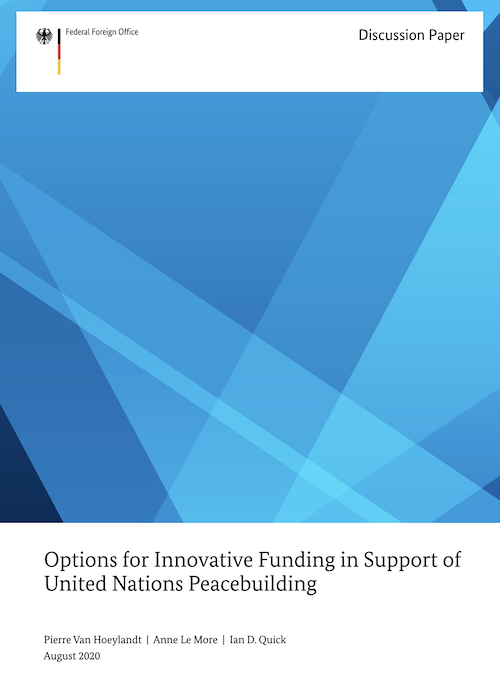
Implementation & financing of Recovery & Peacebuilding Assessments
Why do some strategic frameworks get implemented, and others just remain on paper?
This project looked at Recovery & Peacebuilding Assessments (RPBAs), the peak framework for collaboration between the World Bank, UN and EU in crisis environments.
It reviewed implementation across a dozen countries, over a span of nearly twenty years. The aim was to map out “what worked” for steering and operational coordination; monitoring and tracking results; and organising funding streams.
One key output was common inter-institutional guidance on the implementation “software” that needs to accompany RPBAs, based on emerging good practices and aspirational “gold standards”.
This public version was published by the World Bank, alongside internal products for policy audiences in each of the three institutions.
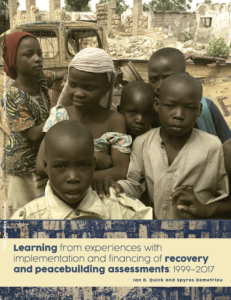
Video seminar series: How stabilisation failed in the Congo
Ten-minute online talks, watchable in coffee breaks, on how international efforts went awry in the Democratic Republic of the Congo.
An open-access version of presentations given to a range of government departments and think tanks over the course of 2015-16, breaking down with maps, charts and photographs what goes wrong with multilateral “stabilisation”.
Searching for a niche: the UN in the Republic of Guinea
Chapter in an edited volume entitled ‘UN peacebuilding architecture: the first 10 years’.
A post-mortem of the UN’s role in Guinea’s democratic transition – and how the world organisation found itself stuck between the traditional model of government-to-government partnership, and demands to be more inclusive and proactive.
Available via Amazon, though extortionately expensive!
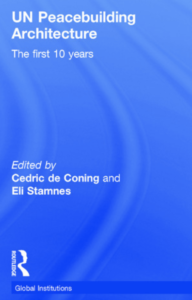
From Brahimi to the HIPPO: UN peacekeeping as a learning organisation
A paper for the Norwegian Institute of International Affairs, on how UN peacekeeping handled its explosive growth from 2000-15. This required learning how to execute unfamiliar new tasks in a dozen different countries, while under immense political pressure.
The practical focus is on takeaways for other institutions such as the African Union. Published by NUPI.
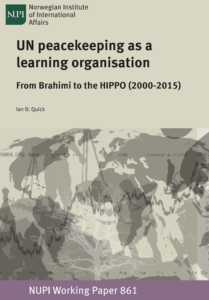
Redefining Success: New Approaches to Engaging With Fragile States
There is a yawning gap between between what we’ve repeatedly said that we would do in fragile states, and the actual results.
This long-form article for World Politics Review tries to redefine what achievable outcomes could look like, anchored in a careful study of history and geography.
Followed-up as featured guest on the very first episode of the Trendlines podcast for World Politics Review. My exchange with host Peter Dorrie starts at 21:00, with me arguing for a ‘better, more sane approach’ in fragile states (his words!). Plenty of fun / depressing DR Congo and Afghanistan facts in this one.
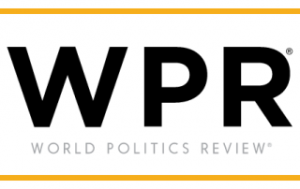
Poor man’s COIN: On counter-insurgency in fragile states
Over the last decade, practitioners and theorists have developed a distinct brand or model of Counter-Insurgency™. This model has developed largely in response to the operational demands of the Iraq and Afghanistan theatres. I argue that it is over-specified to the experiences of rich, Western countries.
This can lead to costly strategic errors in contexts that are very distant from the “classical” cases. Fragile states are one such context, and this paper looks at how to problematise key assumptions and objectives in the counter-insurgency literature.
The argument draws heavily on literature on statebuilding and the political economy of civil wars. The cases used for illustration are Sierra Leone, the Democratic Republic of the Congo, Iraq, Afghanistan and Uganda.
Currently out of print.